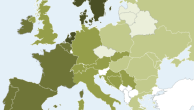
Religious Diversity Around the World
Singapore is the world’s most religiously diverse country overall as of 2020, while Yemen is the least diverse. But the U.S. ranks first among nations with very large populations, followed by Nigeria and Russia.
The Pew-Templeton Global Religious Futures project, funded by The Pew Charitable Trusts, John Templeton Foundation and Templeton Religion Trust, is an effort by Pew Research Center to understand religious change and its impact on societies around the world. It includes three main lines of research: a series of international surveys on religion in various regions; an ongoing demographic study of religion around the world; and an annual coding project that examines restrictions on religion in 198 countries and territories.
Singapore is the world’s most religiously diverse country overall as of 2020, while Yemen is the least diverse. But the U.S. ranks first among nations with very large populations, followed by Nigeria and Russia.
All
Publications
This Pew Research Center analysis harnesses computational techniques to identify, collect and analyze the sermons that U.S. churches livestream or share on their websites each week.
Household size and composition often vary by religious affiliation, data from 130 countries and territories reveals. Muslims and Hindus have larger households than Christians and religious “nones,” influenced in part by regional norms.
Giving a share of one’s income to the church has been a part of European tradition for centuries. Today, several countries continue to collect a “church tax” on behalf of officially recognized religious organizations, in some cases levying the tax on all registered members.
People who are active in religious congregations tend to be happier and more civically engaged than either religiously unaffiliated adults or inactive members of religious groups, according to a new Pew Research Center analysis of survey data from the United States and more than two dozen other countries.
The European continent today is split in public attitudes toward religion, minorities and social issues such as gay marriage and legal abortion.




